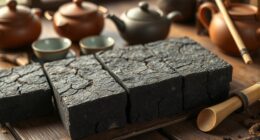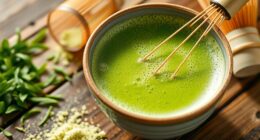As a new mom, I am constantly seeking ways to enhance my health and well-being, particularly while breastfeeding. Recently, I have been intrigued by turmeric tea. This vibrant yellow beverage has been gaining popularity for its supposed health benefits, such as anti-inflammatory effects, better digestion, and strengthened immune system.
However, as a breastfeeding mother, I am concerned about the safety of consuming turmeric tea and its potential effects on my baby. Turmeric tea has been used for centuries in traditional Ayurvedic and Chinese medicine, and its popularity has only increased in recent years. While there is some evidence to support the health benefits of turmeric, there is limited research on its safety for breastfeeding mothers and their infants.
As a result, it is important to consider the nutritional benefits and safety concerns before incorporating turmeric tea into your diet while breastfeeding.
Key Takeaways
- Turmeric tea has potential benefits for breastfeeding mothers, such as anti-inflammatory properties and improved digestion.
- However, there are safety concerns and limited research on the safety of turmeric tea for breastfeeding mothers and infants, including possible interactions with medication and an increased risk of bleeding.
- Breastfeeding mothers should limit their intake to 1-2 cups per day, discuss with their healthcare provider before use, and monitor for signs of allergic reactions.
- Breastfeeding mothers should also ensure adequate intake of essential vitamins and minerals, consult with their healthcare provider or registered dietitian for a personalized nutrition plan, and prioritize self-care and seek support when facing challenges.
What is Turmeric Tea and Why is it Popular?
You’ve probably heard about the popular drink, turmeric tea, which is loved for its unique taste and potential health benefits. Turmeric tea is made by boiling turmeric root or powder in water. It is often combined with other ingredients such as ginger, cinnamon, or honey to enhance the flavor. The tea has a yellow-orange color and a slightly bitter taste, which some people find appealing.
There are several ways to prepare turmeric tea. Some people prefer to use fresh turmeric root, which is grated or sliced and boiled in water. Others use turmeric powder, which is easier to find and more convenient to use. Regardless of the preparation method, the tea is believed to have anti-inflammatory, antioxidant, and immune-boosting properties.
With that said, let’s explore the nutritional benefits of turmeric tea.
Nutritional Benefits of Turmeric Tea
Feeding your little one is like fueling up a car, and incorporating turmeric tea into your routine can enrich your milk with a plethora of nutrients. Turmeric tea recipes are simple and easy to make, often consisting of just a few ingredients like turmeric powder, ginger, and honey.
Turmeric is a spice that has been used for centuries in traditional medicine due to its anti-inflammatory properties. It contains a compound called curcumin, which has been shown to have antioxidant effects and can help boost the immune system.
The health benefits of turmeric for breastfeeding go beyond just boosting the immune system. Turmeric has been shown to help with digestion, reduce inflammation, and even aid in weight loss. Additionally, it contains vitamins and minerals such as potassium, iron, and vitamin C.
However, it is important to note that while turmeric tea can offer many nutritional benefits, there are also safety concerns for breastfeeding mothers that need to be taken into consideration.
Safety Concerns for Breastfeeding Mothers
Moms can enjoy a variety of foods and drinks, but it’s important to be aware of any potential risks that could affect both mom and baby when breastfeeding. While turmeric tea has nutritional benefits, it’s important to consider safety concerns for breastfeeding mothers. Here are three things to keep in mind:
-
Breastfeeding and medication: It’s important to consult with a healthcare provider before consuming turmeric tea while breastfeeding, especially if you’re taking any medications. Turmeric may interact with certain medications, such as blood thinners, and could affect both mom and baby.
-
Exercise and breastfeeding: Regular exercise is important for overall health, but it’s important to consider the timing of consuming turmeric tea if you’re planning to exercise. Turmeric has a warming effect on the body and may cause sweating, which could lead to dehydration. It’s best to consume turmeric tea after exercise and make sure to stay hydrated.
-
Allergic reactions: While rare, some people may experience allergic reactions to turmeric. If you or your baby have a history of allergies, it’s important to monitor for any signs of an allergic reaction after consuming turmeric tea.
It’s important to be aware of these safety concerns when consuming turmeric tea while breastfeeding. However, it’s also important to note that more research is needed to fully understand the effects of turmeric tea on breastfeeding mothers and their babies.
Research on Turmeric Tea and Breastfeeding
If you’re curious about the effects of adding turmeric tea to your diet while breastfeeding, there’s ongoing research that may interest you. Turmeric has been used for centuries in traditional medicine and cooking, and its active ingredient, curcumin, has shown potential health benefits, such as reducing inflammation and improving brain function.
However, there’s limited research on turmeric tea efficacy and side effects specifically for breastfeeding mothers. A small study published in the Journal of Medicinal Food found that consuming turmeric during lactation didn’t have any adverse effects on breastfed infants.
However, more research is needed to determine the optimal dosage and long-term effects of turmeric tea consumption while breastfeeding. It’s always recommended to consult with a healthcare provider before adding any new supplements or herbs to your diet while breastfeeding.
Next, we’ll discuss guidelines for safe consumption of turmeric tea while breastfeeding.
Guidelines for Safe Consumption of Turmeric Tea while Breastfeeding
As a nursing mother, it’s important to follow these guidelines for enjoying the benefits of turmeric without any potential risks to your baby. While turmeric tea is generally considered safe for breastfeeding mothers, it’s important to be mindful of the dosage and potential side effects. Consulting with your healthcare provider before consuming turmeric tea while breastfeeding is also highly recommended.
To ensure safe consumption, it’s recommended to limit your intake of turmeric tea to 1-2 cups per day. Excessive consumption of turmeric may lead to gastrointestinal issues such as diarrhea, nausea, and vomiting, which can be harmful to both you and your baby. Additionally, turmeric has blood-thinning properties that may increase the risk of bleeding, especially if you are taking blood-thinning medications.
| Dosage | Potential Side Effects |
|---|---|
| 1-2 cups per day | Gastrointestinal issues such as diarrhea, nausea, and vomiting |
| Excessive consumption | Increased risk of bleeding, especially if taking blood-thinning medications |
It’s important to remember that while turmeric tea has many health benefits, it’s not the only option available to breastfeeding mothers. In the next section, we will discuss alternatives to turmeric tea that you can incorporate into your diet for a healthy and balanced lifestyle.
Alternatives to Turmeric Tea
As a new mother, I understand the importance of maintaining a healthy diet while breastfeeding. While turmeric tea has numerous health benefits, it may not be the best choice for everyone.
Fortunately, there are plenty of alternatives to turmeric tea that can still provide the nutritional benefits you need. Other herbal teas, nutritional supplements, and dietary changes are all worth exploring, and I’ll discuss each of these options in more detail below.
Other Herbal Teas
You can try other herbal teas like chamomile or ginger to see if they work for you while breastfeeding. These herbal tea options are generally safe for breastfeeding mothers, but it’s important to keep in mind that some herbs may have potential risks.
For example, ginger may cause gastrointestinal upset or interact with certain medications, while chamomile may cause allergic reactions in some individuals. It’s always best to consult with your healthcare provider before trying any new herbal teas or supplements while breastfeeding.
Your provider can help you determine which options are safe and appropriate for you. Now, let’s move on to discussing nutritional supplements as another potential option for breastfeeding mothers.
Nutritional Supplements
Boost your nutrient intake with nutritional supplements that are beneficial for breastfeeding mothers. It’s important to ensure that you’re receiving adequate amounts of essential vitamins and minerals, such as vitamin D, calcium, and iron, which are crucial for both you and your baby’s health. While supplement safety is generally considered to be low, it’s always best to consult with your healthcare provider before starting any new supplements.
One supplement that’s often recommended for breastfeeding mothers is omega-3 fatty acids, which are important for brain and eye development in infants. These can be found in fish oil supplements or in foods like salmon and chia seeds. However, it’s important to note that some fish, such as shark and swordfish, should be avoided due to their high mercury content.
Additionally, while herbal supplements like fenugreek and milk thistle are commonly used to increase milk supply, their safety and effectiveness haven’t been well-studied. It’s always best to err on the side of caution and consult with a healthcare provider before taking any new supplements while breastfeeding.
Ensuring proper nutrition through supplements is just one way to support breastfeeding mothers and their babies. Moving on to the next section, let’s discuss some dietary changes that can also help optimize your breastfeeding experience.
Dietary Changes
To optimize your nursing nutrition, consider making some dietary tweaks that can make a difference in your milk supply and overall health. Breastfeeding nutrition is crucial for both you and your baby, and maintaining a healthy postpartum diet is essential. Here are a few simple dietary changes to consider:
- Incorporate more fruits and vegetables into your meals to increase your intake of vitamins and minerals.
- Choose whole grains over refined grains to increase your fiber intake and promote better digestion.
- Drink plenty of water and other fluids to stay hydrated and support milk production.
Making these small changes can have a big impact on your overall health and milk supply. It’s important to remember that every breastfeeding mother is different, and what works for one person may not work for another. Consult with your healthcare provider or a registered dietitian to create a personalized nutrition plan that works best for you and your baby.
When it comes to breastfeeding, there are other considerations for breastfeeding mothers to keep in mind. These include factors such as medication use, alcohol consumption, and the safety of herbal supplements. It’s important to be informed and seek guidance from healthcare professionals when making decisions about your nutrition and overall health while breastfeeding.
Other Considerations for Breastfeeding Mothers
As a breastfeeding mother, it’s important to be mindful of other factors that may affect the safety of consuming turmeric tea. While turmeric has many health benefits, it’s important to consider any potential risks or interactions with other medications or supplements. Additionally, some women may experience dietary sensitivities or allergies that could make consuming turmeric tea uncomfortable or even harmful for both them and their baby.
To help navigate these considerations, it’s important for breastfeeding mothers to consult with a healthcare provider before incorporating turmeric tea into their diet. A healthcare provider can help assess any potential risks or interactions based on the mother’s medical history and current medications or supplements. Additionally, a healthcare provider can help identify any dietary sensitivities or allergies that may be exacerbated by consuming turmeric tea.
| Breastfeeding Challenges | Self Care Tips |
|---|---|
| Breast engorgement | Use warm compresses and breast massage to relieve pressure |
| Mastitis | Seek medical treatment and continue breastfeeding |
| Low milk supply | Increase frequency of breastfeeding and consider lactation support supplements |
As a breastfeeding mother, it’s important to prioritize self-care and seek support when facing challenges. Incorporating turmeric tea into your diet can be a healthy choice, but it’s important to do so with caution and guidance from a healthcare provider.
Next, let’s explore the personal experiences of breastfeeding mothers with turmeric tea.
Personal Experiences of Breastfeeding Mothers with Turmeric Tea
Breastfeeding mothers have shared their personal experiences with incorporating turmeric tea into their diet during lactation. Some mothers have reported that consuming turmeric tea has helped alleviate breastfeeding challenges such as mastitis, engorgement, and inflammation.
Turmeric has anti-inflammatory properties, which can help reduce pain and swelling in the breast tissue. It also has antibacterial properties, which can help prevent and treat infections such as mastitis.
In addition to its potential benefits for breastfeeding challenges, turmeric also has numerous health benefits that can be beneficial for both the mother and baby. Turmeric has been shown to have antioxidant properties, which can help protect the body from damage caused by free radicals. It also has anti-cancer properties and may help prevent the development of certain types of cancer.
However, it’s important for breastfeeding mothers to consult with their healthcare provider before incorporating turmeric tea into their diet, as some studies have shown that high doses of turmeric may interfere with certain medications or have other adverse effects.
Frequently Asked Questions
Can turmeric tea affect the taste of breast milk?
Turmeric tea may affect the taste of breast milk, but there is no evidence of harm to the baby. It has potential benefits for gut health due to its anti-inflammatory properties, but more research is needed.
Is it safe to consume turmeric tea while taking medication?
Oh sure, taking medication and drinking turmeric tea is like mixing oil and water – it’s a great idea! Just kidding, be careful as there may be interactions and possible side effects to consider. Always consult with your healthcare provider.
How much turmeric tea is safe to drink while breastfeeding?
As a nursing mother, I would recommend consulting with a healthcare provider before drinking turmeric tea. While turmeric tea benefits are well-known, the safety of consuming it while breastfeeding is uncertain. There are various turmeric tea recipes available, but it’s essential to consider potential risks and benefits.
Can turmeric tea cause an allergic reaction in breastfed infants?
Like a bee sting to a flower, turmeric tea may cause potential allergic reactions in breastfed infants. Safety precautions should be taken, including consulting with a healthcare provider before consuming.
Can turmeric tea affect the mother’s milk supply?
Turmeric tea does not appear to have any significant impact on milk production or breast milk flavor. However, it’s important to consult with a healthcare professional before consuming any herbal teas while breastfeeding.
Conclusion
Overall, as a breastfeeding mother, I’ve found turmeric tea to be a safe and delicious addition to my daily routine. While there are some safety concerns to consider, such as the potential for allergies and interactions with medications, research suggests that moderate consumption of turmeric tea is generally safe for breastfeeding mothers and their babies.
One interesting statistic to note is that turmeric has been used for medicinal purposes in India for over 4,000 years and has been found to have anti-inflammatory and antioxidant properties. It’s no wonder that turmeric tea has become so popular in recent years, with many people touting its health benefits.
As with any new food or drink, it’s important to consult with a healthcare provider before incorporating turmeric tea into your diet while breastfeeding. With proper guidance, turmeric tea can be a flavorful and nutritious addition to a breastfeeding mother’s diet.










